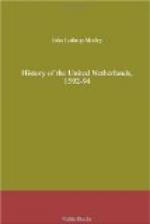He was further directed to leave Count Mansfeld at the head of affairs during this temporary absence, as had been the case so often before, instructing him to make use of the Marquis of Cerralbo, who was already there, to lighten labours that might prove too much for a man of Mansfeld’s advanced age.
“I am writing to the marquis,” continued the king, “telling him that he is to obey all your orders. As to the reasons of your going away, you will give out that it is a decision of your own, founded on good cause, or that it is a summons of mine, but full of confidence and good will towards you, as you see that it is.”
The date of this letter was 20th February, 1592.
The secret instructions to the man who was thus to obey all the duke’s orders were explicit enough upon that point, although they were wrapped in the usual closely-twisted phraseology which distinguished Philip’s style when his purpose was most direct.
Cerralbo was entrusted with general directions as to the French matter, and as to peace negotiations with “the Islands;” but the main purport of his mission was to remove Alexander Farnese. This was to be done by fair means, if possible; if not, he was to be deposed and sent home by force.
This was to be the reward of all the toil and danger through which he had grown grey and broken in the king’s service.
“When you get to the Netherlands” (for the instructions were older than the letter to Alexander just cited), “you are,” said the king, “to treat of the other two matters until the exact time arrives for the third, taking good care not to, cut the thread of good progress in the affairs of France if by chance they are going on well there.
“When the time arrives to treat of commission number three,” continued his Majesty, “you will take occasion of the arrival of the courier of 20th February, and will give with much secrecy the letter of that date to the duke; showing him at the same time the first of the two which you will have received.”
If the duke showed the letter addressed to him by his uncle—which the reader has already seen—then the marquis was to discuss with him the details of the journey, and comment upon the benefits and increased reputation which would be the result of his return to Spain.
“But if the duke should not show you the letter,” proceeded Philip, “and you suspect that he means to conceal and equivocate about the particulars of it, you can show him your letter number two, in which it is stated that you have received a copy of the letter to the duke. This will make the step easier.”




